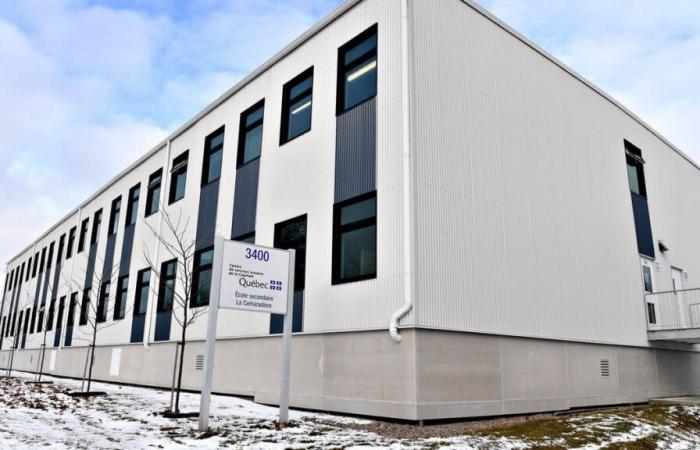Overflowing schools are multiplying in Quebec, so much so that the sums devoted to the installation of modular classes are reaching new heights: more than $400 million has been spent on these temporary premises in the school network for… only three years .
This upward trend is not about to run out of steam, since Quebec has cut funding allocated to new school construction and expansion projects this year, despite growing needs.
• Also read: Slowdown in school construction
The Ministry of Education estimates that Quebec schools will have to accommodate 20,000 more students by the end of June alone.
A “mistake”
In this context, favoring temporary premises to the detriment of construction sites is a “bad decision,” says Martin Maltais, professor specializing in financing and education policies at the University of Quebec in Rimouski.
Quebec is probably betting that it will be able to “curb the migratory flow” within a few years, but this scenario is not likely to materialize, according to this expert. “It’s a mistake,” he says.
414 million for temporary premises
Since the start of the 2021 school year, at least 26 school service centers have spent $414 million to install temporary premises, according to access to information requests made by The Journal in the 72 school service centers in the province.
This is an incomplete assessment since around ten organizations did not respond to this request.
Several modular classes have been rented since 2021, but more and more service centers are now purchasing these facilities, a much more advantageous option in the medium and long term, the school network explains.
Many service centers will have to resort to temporary classes for many years to come.
“Some say that there is nothing more permanent than temporary premises,” laughs Roch-André Malo, general director of the Mille-Îles School Service Center, located in the Basses-Laurentides.
“I don’t believe that we will be able to get rid of our modular premises before eight to ten years,” he adds more seriously, specifying that this is an “optimistic” scenario.
The situation is particularly problematic at the secondary level, where three new schools would have to be built to eliminate the current space deficit of 3,000 places, while only one construction project is currently being studied, specifies the general director.
An “excellent plan B”
The Quebec Minister of Education, Bernard Drainville, for his part recently affirmed that “plan A” remains the construction and expansion of schools, while adding that modular classes represent an “excellent plan B”.
These facilities, modern and sometimes even air-conditioned, no longer have anything to do with the “construction trailers” of another era, he argued.
With the “current increase in the number of children, due among other things to temporary immigration, we must find other solutions, particularly with modular units which are of very high quality,” adds his office.
The lifespan of these premises varies, but it can be up to 20 years, or even up to 35 years in the case of more sophisticated installations, according to the school network.
Costs associated with the installation of modular classrooms: some examples
School service center
- Grandes-Seigneuries (Montérégie): $62.4 million
- Marie-Victorin (Montérégie): $45.3 million
- From La Capitale (Quebec): $41.1 million
- Première-Seigneuries (Quebec): $40.5 million
- Mille-Îles (Lower Laurentides): $39.3 million
- Des Navigateurs (Chaudière-Appalaches): $28 million
Source: information collected from school service centers, for modular premises rented or purchased since 2021.
Do you have any information to share with us about this story?
Write to us at or call us directly at 1 800-63SCOOP.






